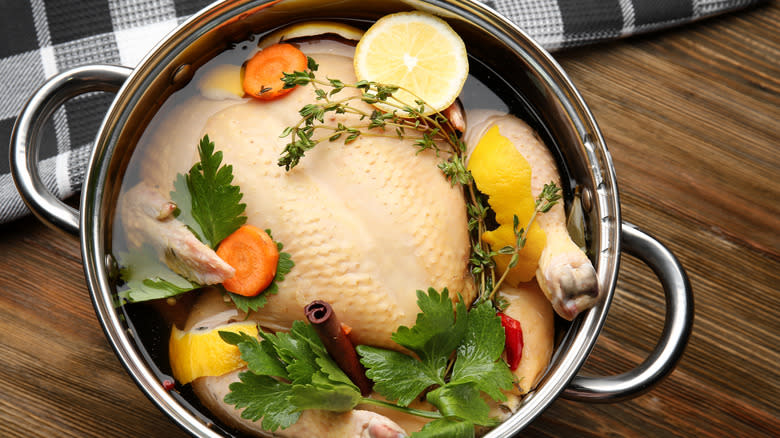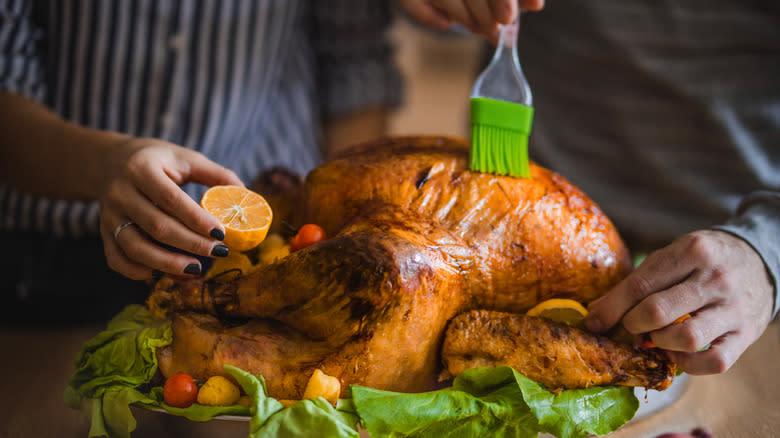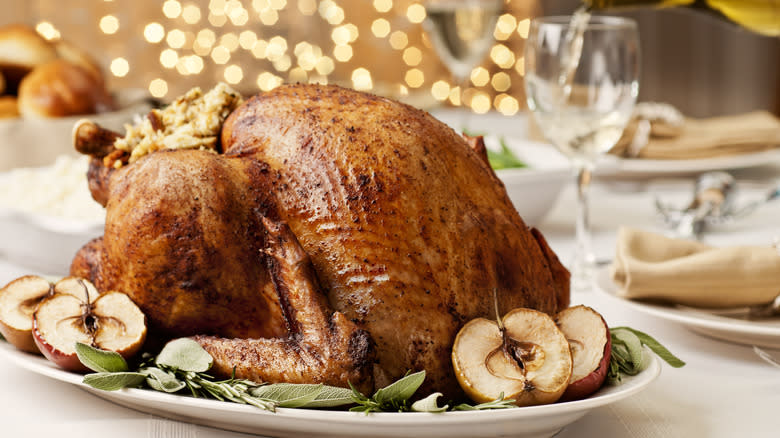Should You Brine Your Turkey Before Smoking?

When it comes to Thanksgiving, every family has a specific way of preparing a turkey. Some families opt to create a cornbread stuffing, while others prefer to use citrus fruits to bring out a tanginess in the meat. Also up for debate is the subject of whether or not you should brine the bird. And it's entirely up to you whether or not you take this extra step.
According to the USDA, brining turkey can be beneficial, as it could ensure a more tender and juicier bird. A popular method is submerging a turkey in a saltwater bath. You can also add other ingredients, such as sugar and honey, to impart a sweeter flavoring. The salt interacts with the muscle proteins in the turkey, causing them to soften and begin to dissolve. The added moisture from the water should stop the turkey from drying out, especially when slow cooking it in a smoker. To brine turkey in saltwater, you first need a large pot that will allow the liquid to cover the turkey. Typically, you would let the turkey sit for around 12 hours prior to smoking.
However, some experts advise against brining turkey, arguing that it ruins the bird's natural flavor.
Read more: 15 Tricks For Making The Most Crispy Chicken Thighs Ever
Inject The Turkey For More Flavor

Instead of brining your turkey, you may want to consider injecting it, especially if you're smoking it. Brining turkey in a saltwater bath may lead to a more tender bird, but it can also ruin the crispiness you might get from smoking the turkey. Because the moisture settles into the outer layer of skin, it's hard to create a golden crunch. Instead, the turkey could end up soggy.
While injecting the turkey doesn't cover all areas of the turkey equally, it does allow you to target the areas that matter the most — specifically, the white meat. Both white meat and dark meat have different cook times, with white meat typically cooking faster than dark meat. As a result, the turkey's breasts and wings can become overly dry due to the discrepancies. Focusing an injection of olive oil or butter into the white meat can keep it moist, similar to how brining would. The added benefit is that you don't have to go through the hassle of submerging the turkey.
Additionally, injecting a turkey takes less time. Whereas you have to wait at least half a day while brining a turkey, you can inject the bird right before you throw it in the oven. Consider combining injection with dry brining your turkey for the best of both worlds.
Consider Dry Brining

When most people think of brining a turkey, they think of a wet brining solution. However, there is another type of brining. Dry brining involves rubbing the turkey with a combination of seasonings. The process is beneficial for a couple of reasons. Dry brining locks in the bird's moisture and should lead to a juicy turkey, especially if you combine with injections.
Salt and other seasonings also help tenderize the turkey, as they're absorbed through the turkey's skin. You also don't have to find a large pan to put the turkey in for several hours, as you would with wet brining. Simply coat the bird in seasoning and let it sit in the fridge until you're ready to smoke it.
By dry-brining your turkey, you can add to the flavor of the meal, giving its skin a saltiness and zest that might have otherwise been missing. Because the turkey isn't sitting in saltwater, it's unlikely to lose its natural juices and flavors in the process. When combined with a butter or olive oil injection, dry brining can make your turkey the hit of the holiday season.
Read the original article on Daily Meal.

